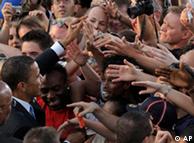Press Review | 25.07.2008 /dw
German Press Review: Obama's Incarnation
German papers on Friday generally applauded US presidential contender Barack Obama's Berlin speech. But some also added that Germans now had to wake up and smell the coffee.
Berlin's Der Tagesspiegel was enthusiastic about Obama's appearance. "This speech had to, and could only, be given in Berlin," it wrote. "Barack Obama's address … might not have been statesmanlike and it definitely wasn't worldly-wise. But with its symbolism and the message of this 46-year-old, it certainly was the signal of a new era for a new generation on both sides of the Atlantic. It's unlikely that so many young people have ever gathered for a political event in Germany before. What does this tell us for Germany? For Berlin? 'Look at this city,' he kept quoting the big freedom speech of (then Berlin Mayor) Ernst Reuter 60 years go. What better thing could have happened to us than the potential next president of the US sending this message to the world from here?"
The Sueddeutsche Zeitung was much more cautious and questioned whether Obama had really just spoken as a proud citizen of the United States and a fellow citizen of the world. "One shouldn't overestimate the Berlin speech," the Munich daily wrote. "Obama has proven to be a clever tactician during the campaign. He always knows his audience. In Berlin, he won over enthusiastic Germans, but his real audience was hesitant white voters in Ohio and Pennsylvania, Colorado and Virginia. He wants to convince them that the world will also listen to a black president. That's why this was staged in Berlin. Americans still see Germans -- despite their resistance against the war in Iraq -- as a trustworthy ally and not as unruly as the French or as willing as the British. And there's one other thing one shouldn't forget when talking about Obama: He easily reworks even positions that have been written in stone and adjusts to new requirements. He's watered down his resistance to free trade agreements, and the complete withdrawal from Iraq is no longer part of his program. One shouldn't forget this when analyzing the content of Obama's Berlin speech."
Mass-market tabloid Bild covered Obama's visit extensively and placed a picture of one of its reporters with the presidential candidate in a Berlin gym on its Friday cover. While acknowledging that Obama would ask Germany for more, its commentator also hailed the speech. "Barack Obama reached the hearts of his audience," he wrote. "This man, who wants to change so much in his own country, sticks to the American dream: that politics can change the world. Unlike George W. Bush, he wants to do this in cooperation with others, especially Europe. That's his message from Berlin: Let's try this together! A President Obama won't let others get involved for free, though. He didn't say what he expects, but it's not hard to figure it out. He'll call for more German participation during international crises; he'll call for more German soldiers. No matter how you might feel about this: A President Obama would be Germany's friend -- and a fan of Berlin!"
The Financial Times Deutschland gave a more sober assessment. "Obama's speech was an advertisement for the struggle against terrorism," it wrote. "He called upon the spirit of the Berlin air lift and used this to demand Germany's solidarity. The federal government now finally knows that he will expect more participation in Afghanistan. The United States doesn't accept that they have to be worn down in the fight against the Taliban while the Germans play the role of friendly reconstruction worker. While the government already knows what to expect, the voters of the large political parties will soon experience a rude awakening when they see that Obama's new America pursues the old goals."
And the left-wing Berlin daily die tageszeitung, which had a picture of Obama as a superhero with the headline "Come off it!" on its Thursday cover, was glad that the American guest had become more human. "Did Obama become more mundane after his speech? Yes, and that's a good thing," it wrote. "One the one hand, his rhetorical weaknesses became apparent. His hymn to the brave frontier city Berlin connected with Kennedy and Reagan. But the 'light and darkness' metaphor, which excites so many in the US, seemed strangely borrowed here -- as if he were calling on a bright past that isn't his own yet. His rhetoric was much more powerful wherever he painted the dangers of globalization in dark colors in order to let the central message shine even brighter: More cooperation is not only desirable, but necessary -- especially as far as climate protection is concerned. That's something only few in the US, but many in Germany like to hear."

Comments